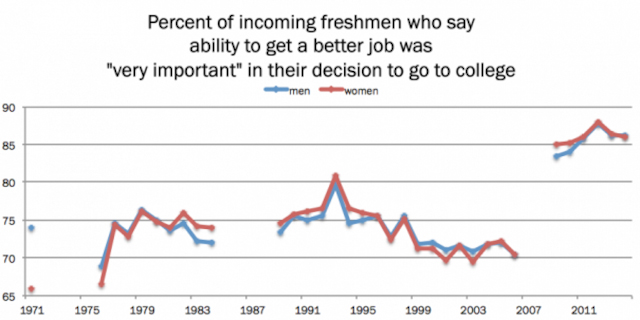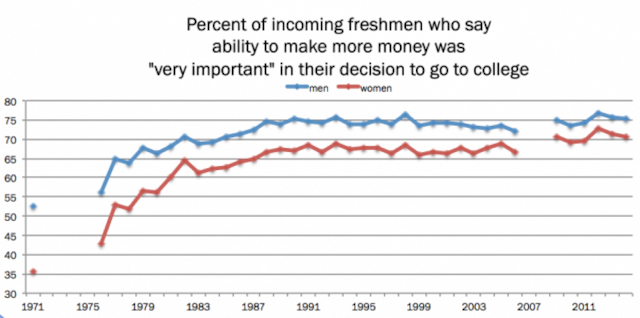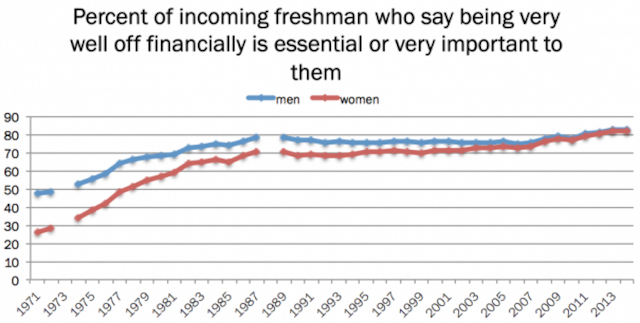Why do you go to college?
For the career driven, college is the ticket to a good job, with enviable pay, benefits, and security. To more introverted students, college is a chance to learn about themselves – and what interests them. And of course you’ll find lost souls looking to get away, make new friends, and cut loose.
These aspirations have remained universal. However, two groups often arrive on campus with very different goals. We’re talking about men and women. Over time, their ambitions change. That was a key finding of a new study produced by the Cooperative Institutional Research Program (CIRP), which has conducted its freshman survey since 1966. Along with gender differences, the study also found a decrease in alcohol and tobacco use and a growing interest in graduate degrees.
The CIRP study is administered annually by the Higher Education Research Institute (HERI) at UCLA’s Graduate School of Education and Information Studies. It was based on responses from over 153,000 first time, full-time students at 227 four-year schools in the United States.
WOMEN MORE INTELLECTUALLY CURIOUS AND MEN MORE CAREER DRIVEN
Over the past 25 years, men and women have been divided when it comes to what draws them to college. Here, incoming women have consistently placed a higher emphasis on outcomes like gaining a greater appreciation of ideas, learning about things that interest them, and becoming a more cultured person. In fact, the split is relatively consistent over the years. For example, women have steadily valued “to get a general education and appreciation of ideas” at a 15% higher rate than incoming freshmen men (with the high point for this category being in the mid-1970s and the low point coming in the mid-1990s for both sexes). This trend bears out (to a less extent) for the other two categories as well. However, men’s interest in these areas has slowly crept up in recent years.
While women enter school with a stronger liberal arts bent, the sexes were relatively equal when it comes to their careers. Since the 1970s, women have grown increasingly interested in career, often slightly ahead of men in this category. Since the 2008 finance collapse, both sexes have converged when it comes to “the ability to get a job” being very important to their decision to attend college – with roughly 86% of men and women agreeing.
However, their motivations are often quite different. When asked how important making more money was to their decision to go to college, 75% of men – and 71% of women – answered “very important.” However, this gap has narrowed in recent years. Forty years ago, nearly 15 percentage points separated the genders. Twenty years ago, the gap had narrowed to eight percent.
In fact, you’ll find a similar dynamic when incoming freshmen are asked about being well-off. Here, the number of men and women answering “very important” has been nearly identical since 2007. Forty years ago, men valued financial security by a 20% higher margin than women.
JOBS DRIVING COLLEGE ENROLLMENT
By all measures, the career values of freshmen men and women have grown increasingly similar over time. And that also applies to what incoming students value as a whole. Here, jobs ranks number one. According to the CIRP study, 86.1% of freshmen overall consider “to be able to get a better job” as “very important” in their decision to go to college. That was four points higher than “to learn about things that interest me” and nine points above “to get training for a specific career.” Not surprisingly, “to make me a more cultured person” ranked last, with only 46.6% considering it very important to their decision.















Questions about this article? Email us or leave a comment below.